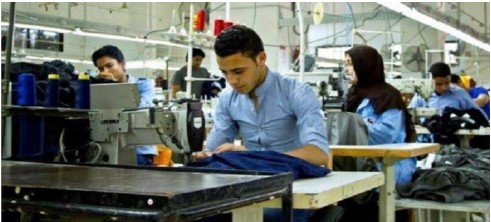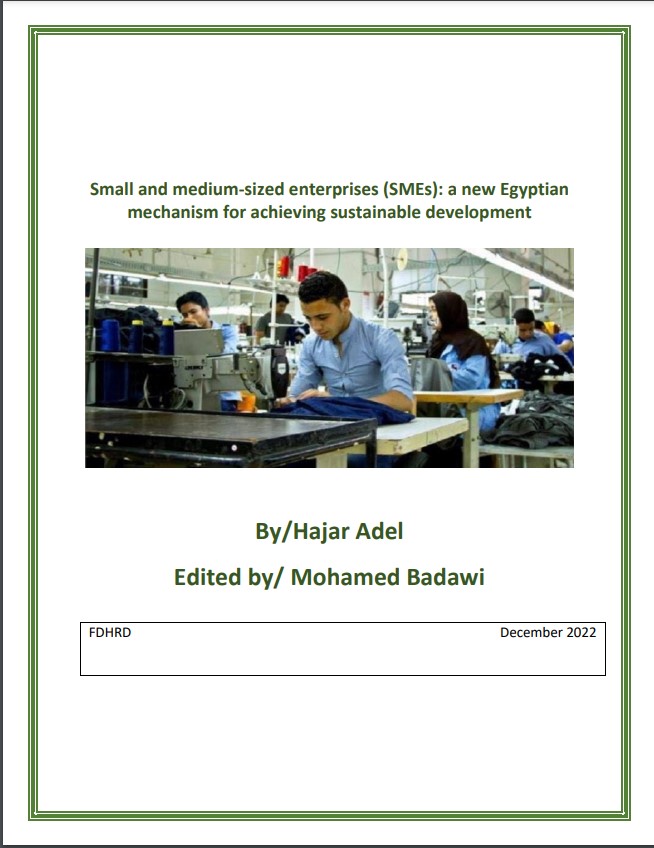Today, Monday, December 26, 2022, The Forum for Development and Human Rights Dialogue (FDHRD) issues its report on small and medium enterprises as a new Egyptian way to achieve sustainable development. It deals with the importance of small and medium enterprises and their pivotal role in sustainable development. Small and medium-sized enterprises (SMEs) are considered one of the economic sectors that is getting a lot of attention from all countries across the world, as well as international and regional organizations and bodies in light of global economic changes.
It improves productivity, generates and increases income, employs semi-skilled and unskilled labour, encourages innovation and technological progress, and increases local added value. It is characterized by efficient use of capital, due to the direct connection of the project ownership with its management, and the owner’s keenness on the success of his project and its management in the best way. Therefore, small projects represent the backbone of the economies of many countries, including Egypt,
The report addressed several points related to SMEs, especially at the Egyptian level, as follows:
Definition of SMEs – Characteristics of SMEs- Types of SMEs- The importance of SMEs for sustainable development- Egyptian efforts in regards to SMEs- Recommendations
The report indicated that small enterprises have the greatest impact in providing new job opportunities and reducing unemployment, especially among young people, given that they are labour-intensive projects. Their diversity provides an opportunity for skilled and unskilled labour.
The report also indicated that Egypt is one of the largest Arab countries in terms of the number and density of SMEs operating in it. The number of these projects is about 2.45 million, with about 39,000 projects added annually, on average. According to 2019 statistics, about 85% of these projects are classified as micro enterprises, while 14% of them are small projects, and only about 2% are medium projects. However, in previous years, these percentages were different, as the percentage of micro-enterprises reached about 97% of the total operating enterprises, followed by small enterprises at 3%, with a sharp decline in medium-sized enterprises.
The report also ended with a set of recommended the following:
- Providing more financing for SMEs, especially through the private sector and banks, as well as providing tax and customs facilities and benefits to the private sector, which undertakes or contributes to the financing of SMEs.
- Providing free courses for young people on how to start a small project and its foundations, while training and raising the skills of owners of ongoing SMEs.
- Paying attention to technical education and its development and vocational training centers, in a way that contributes to raising the professional level of graduates.
- Activating the role of civil society institutions, such as non-governmental organisations and businessmen’s associations, providing them with financing enough to re-lend, in light of their experience in dealing with small and micro projects in non-traditional ways.
- Committing the projects that receive government tenders to have a percentage of the inputs for the owners of SMEs.
- Providing the necessary means of support to facilitate a supportive environment for innovative and entrepreneurial projects, setting specific standards and indicators, and monitoring and evaluating the performance of these projects. This should be with the aim of measuring their return on sustainable economic development, in a way that contributes to a positive change in cultural patterns that support the culture of self-employment.
- Creating a broad base of entrepreneurs and innovators, and an incubating environment for them and their innovative projects. This could be done through technical or financial support, direct government or through the private and academic sectors or civil society organizations, while emphasizing the importance of coordinating and intertwining these efforts.
- Concentrating the efforts of all stakeholders, governmental and private, and continuous coordination between the various key players. This is to achieve fruitful and constructive cooperation between the entities supporting business environments and start-ups, to reach the following goals, for example:
- Raising the competitiveness of the entrepreneurship sector, and the economic contribution of emerging companies, as well as measuring the return on development.
- Organizing the relationship between the supporting agencies, and proposing solutions to the most important challenges facing the national economy in the Arab countries. It is vital to translate them into opportunities for entrepreneurial and emerging companies, and interdependence between the various agencies.
- Localizing development and deepening value chains based on innovation, which will be reflected in attracting local and foreign investments, and opening new markets.
For his part, Saeed Abdel Hafez, Chairman of the FDHRD, affirmed that SMEs are the locomotive of development in Egypt. It is one of the important tools to fight poverty and empower women to a large extent. SMEs are a basic pillar for sustainable development in Egypt. Their contribution to the optimal exploitation of local resources and the fight against unemployment and the achievement of a fair balance of income
Hagar, a researcher at the FDHRD, stressed the importance of the role of SMEs and entrepreneurship, because of their important economic role in enhancing competitiveness and improving economic indicators, in a way that contributes to achieving comprehensive and sustainable economic development in various sectors.
Small and medium enterprises are a new Egyptian mechanism to achieve sustainable development








